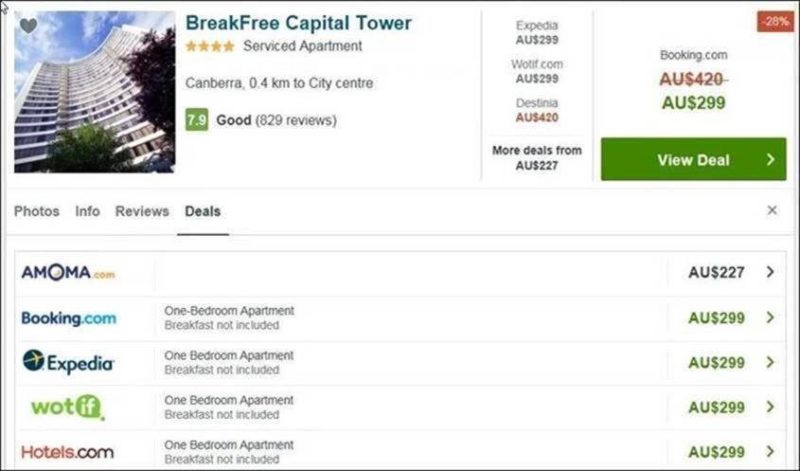Federal Court orders Trivago to pay $44.7 million in penalties for misleading consumers
The federal has ordered hotel comparison platform Trivago to pay $44.7 million in penalties during proceedings brought forward by the ACCC.
In January 2020 the Federal Court found that the Expedia Group platform had had breached the Australian Consumer Law by misleading consumers about hotel room rates on its website and in its television advertising.

An example of the Trivago online display from April 1 2018.
While Trivago had claimed that its website would quickly and easily help users identify the best deal or cheapest rates available for a given hotel, it was actually using an algorithm that placed significant weight on which online hotel booking site paid Trivago the highest cost-per-click fee. Thus, the highlighted rates on the Trivago website often did not highlight the cheapest rates for consumers.
Trivago admitted that between December 2016 and September 2019 it received approximately $58 million in cost-per-click fees from clicks on offers that were not the cheapest available offer for a given hotel, causing consumers to overpay hotel booking sites approximately $38 million for rooms featured in those offers.
“One of the ACCC’s key priorities is to hold online businesses accountable for their representations to consumers and to ensure consumers are fully aware of the way these supposedly free services actually work and what influences the prices they display,” said ACCC chair Gina Cass-Gottlieb.
“The way Trivago displayed its recommendations when consumers were searching for a hotel room, meant consumers were misled into thinking they were getting a great hotel deal when that was not the case.”
“Trivago also mislead consumers by using strike-through prices which gave them the false impression that Trivago’s rates represented a saving when in fact they often compared a standard room with a luxury room at the same hotel,” Cass-Gottlieb added.
“Trivago’s conduct took advantage of consumers’ desire to find the best deal, and the Court’s decision to order such a significant penalty reflects the seriousness of Trviago’s conduct.”
“This penalty sends a strong message not just to Trivago, but to other comparison websites, that they must not mislead consumers when making recommendations,” Cass-Gottlieb concluded.
The proceedings were first launched by the ACCC in August 2018, during which Trivago admitted to its misleading conduct. In March 2020 Trivago appealed the Federal Court’s ruling, however this was dismissed by the Federal Court in November 2020.




Have your say